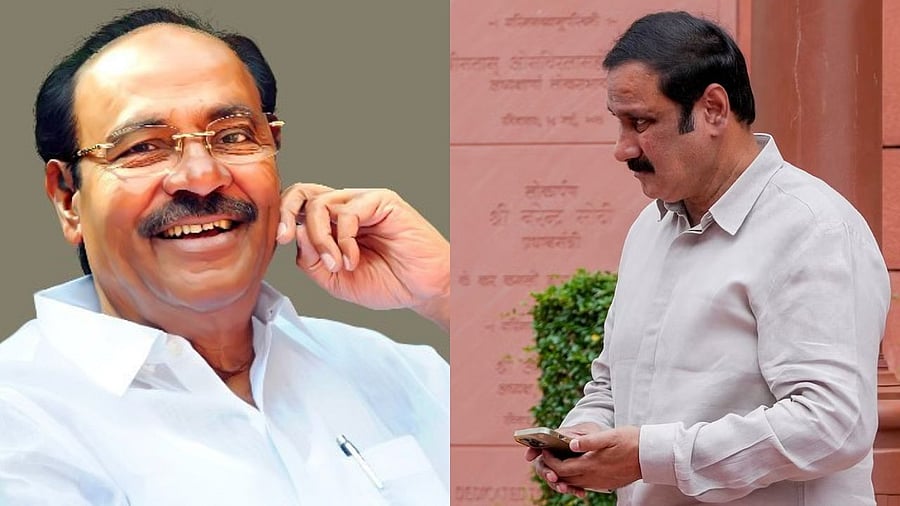
PMK founder S Ramadoss (left) and his son Anbumani Ramadoss.
Credit: X/@drramadoss and PTI File Photo
Chennai: Deepening the crisis within the party and family, Paatali Makkal Katchi (PMK) founder S Ramadoss on Thursday expelled his son and party president Anbumani from the party, citing “unprecedented anti-party activities” and accusing him of being a “misfit” in politics.
The dramatic announcement came after Ramadoss chaired a high-level administrative council meeting at his farmhouse in Thailapuram near Tindivanam in the Villupuram district.
“Anbumani is expelled from the PMK’s primary membership. The weed called Anbumani is being removed from the PMK,” Ramadoss told a press conference.
Expectedly, Anbumani did not react to his father’s decision, but his close aide K Balu said Ramadoss does not have the authority to expel the party president, who was duly elected by the General Council. “Anbumani will continue to be the president of the PMK,” Balu added.
PMK wields significant influence among Vanniyars, a dominant community spread across northern and central parts of the state and has a committed 5 per cent vote bank. However, the split is likely to reduce the party’s bargaining power in alliance negotiations if no resolution is reached before the Assembly elections next year.
The decision, according to Ramadoss, came after Anbumani failed to respond to a detailed questionnaire sent by the party seeking his explanation for allegations against the leadership.
Though such a move was not completely unexpected, as Ramadoss had continued to target his son publicly and even accused him of planting a bugging device under his chair, the decision is set to deepen the crisis within the PMK and the first family.
Thursday’s development is seen as the culmination of simmering differences between the father and son for about a year. Multiple rounds of separate talks with Ramadoss and Anbumani by several well-wishers in recent months failed to resolve the standoff.
The developments in the PMK are also a body blow to the National Democratic Alliance (NDA), which is now left with only two major parties -- the AIADMK and BJP. Already, the NDA in Tamil Nadu has weakened in the past two months, with O. Panneerselvam and AMMK’s T T V. Dhinakaran exiting the alliance, blaming the BJP leadership for cold-shouldering them at the insistence of AIADMK general secretary Edappadi K Palaniswami.
Ramadoss was unsparing towards Anbumani on Thursday as he accused his son of running a parallel party structure and not obeying his orders. “PMK is a party that I founded. If Anbumani wants, let him float a new party. He has no place in the PMK from now,” the senior politician said.
Accusing Anbumani of trying to destroy the PMK, Ramadoss called his son a “misfit” in politics. “Without my support, Anbumani would not have become what he is today. No one from the PMK should maintain any ties with Anbumani,” he added.
Dynasty politics
It all began in December 2024, when Anbumani publicly accused his father of promoting dynastic politics following Ramadoss’s decision to parachute one of his grandsons, Parasuraman Mukundan, into the post of youth wing chief. Since then, the two have been sparring, with the father demoting the son to working president and assuming the role of president in April 2025.
The senior Ramadoss had appointed himself as president of the PMK in April after relegating his son to working president, setting the stage for a confrontation which has played out in public over the past two months.
The public spat has underscored not only the power struggle within the family for control of the PMK, but also for the cash and asset-rich public trusts, including the party’s parent organisation, the Vanniyar Sangam, formed for the community’s welfare.
Ramadoss has been upset with the PMK’s tilt toward the BJP in recent years under Anbumani’s leadership. The party’s failure to win in its stronghold of Dharmapuri for the second consecutive Lok Sabha polls in 2024 is cited as one of the factors that led Ramadoss to rethink the party’s alliance strategy.
He wants the PMK not to dilute its core agenda of uplifting the lives of Vanniyars and to ally only with Dravidian parties, if necessary. PMK, whose influence has been waning even among Vanniyars, still commands a committed vote bank of about 5 per cent and was part of the A B Vajpayee-led government and the UPA-I.
The party, which came into being in 1989 primarily to espouse the cause of Vanniyars, has swung like a pendulum between the DMK and AIADMK for decades, and eventually aligned with the BJP after its solo experiment failed in 2016.